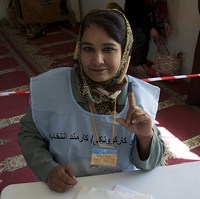This weekend's first round of Afghanistan's presidential election saw the country's political institutions perform much better than during the 2009 ballot, while the Afghan National Security Forces (ANSF) provided a relatively safe and secure electoral environment. The winners may not be clear and certified until May. It seems likely that no candidate received more than half the votes, meaning that a runoff between the two leading candidates will probably occur in June. But already the results offer hope for Afghanistan's status as a functioning democracy in which multiple candidates compete for the highest offices in elections whose outcome cannot be predicted in advance.
There was evidence of fraud, but it does not seem so pervasive as to have substantially affected the outcome. In addition, despite years of violence and disappointment, defiant voters cast their ballots in exceptionally large numbers, with perhaps 7 million Afghans going to the polls Saturday. As a result, we will soon see Afghanistan's first transition from one democratically elected president to another.
The process stands in stark contrast to the 2009 presidential election, in which approximately 1 million fraudulent votes were cast for the incumbent, President Hamid Karzai. The Independent Election Commission, run by Karzai’s appointed partisans, was, despite its name, anything but independent. Of the 7,000 polling centers, at least 1,500 were located in areas outside government control. An upsurge of Taliban attacks across the country in the days leading up to the election succeeded in dissuading many people from going to the polling centers, with less than 4 million out of a possible 11 million eligible voters casting their ballots. The September 2010 elections to the Wolesi Jirga, Afghanistan's lower house of parliament, also saw pervasive fraud, widespread Taliban disruptions and low turnout.

